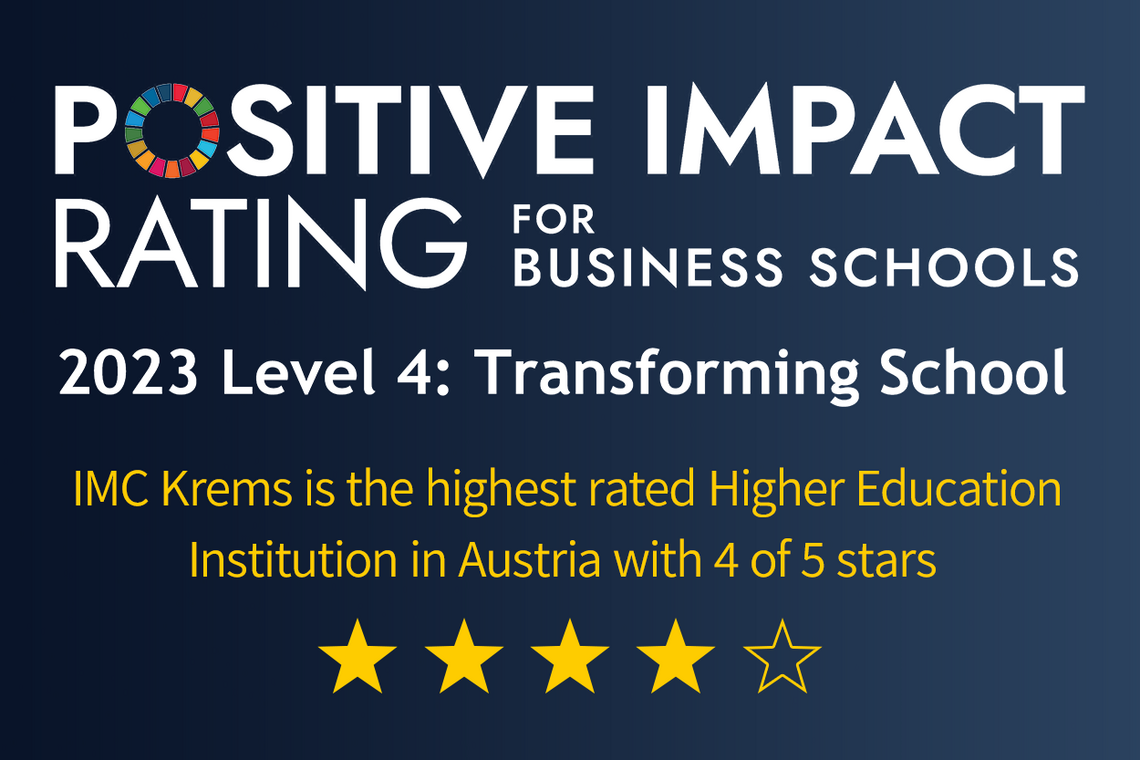Press
Great success for IMC Krems in Positive Impact Rating

The results of the Positive Impact Rating (PIR) were announced on June 14, 2023, in New York, USA, at the PRME (Principles for Responsible Management Education) Global Forum. The forum aims to spark a global debate on how business education can help advance the sustainable development agenda worldwide. Business school leaders, faculty, students, companies and sustainable development organisations came together for this purpose. In the course of the PRME Global Forum, the results of the PIR were announced under the title “Accelerating the societal impact of business schools” – a great success for IMC Krems University of Applied Sciences.
IMC Krems participated for the second time after 2021 and achieved level 4 out of 5, putting it in a category with renowned universities such as Aalto University School of Business in Finland or Imperial College Business School in the UK. It even surpassed other well-known institutions. IMC Krems is the only university in Austria to be ranked.
Positive impact on the world
The Positive Impact Rating (PIR) is administered by a Swiss association that was founded by a group of business school experts and is supported by WWF, Oxfam International, UN Global Compact Switzerland and others. The PIR is a rating conducted by students and for students. For the fourth time, students around the world assessed their business schools on how they perceive their positive impact on the world. Prof. Thomas Dyllick of the Positive Impact Rating Association and Lauriane Dietrichs, Vice President of oikos International, announced the results for the social impact of 69 business schools from 25 countries.
Developing countries ahead of developed countries
The rating survey asks students 20 questions in seven relevant impact dimensions: governance and culture of the school; study programmes, learning methods, and student support; the institution as a role model and its public engagement. The resulting PIR score of the business school is used to position colleges on five levels. The different levels refer to the levels of achievement in developing the school’s societal impact. Business Schools are provided with a defined societal impact model and a tool they can use for measuring and benchmarking their impact.
Level 5 (Pioneering Schools) features seven universities with an average score of 9.2 – all from developing countries. Level 4 (Transforming Schools) includes 39 universities with an average score of 7.8, dominated by 21 European institutions including IMC Krems.
Level 3 (Progressing Schools) consists of 23 schools with an average score of 6.8. What is striking in these results is that schools from developing economies perform significantly better than those from developed economies. This is probably due to the fact that the PIR measures business schools based on their impact on society. Contributing to societal problems is something that many business schools in developed economies are only now beginning to address.
Voices on the rating
The PIR can and should be used to measure and develop the societal impact of “business schools” (colleges and universities offering business courses). It provides a status quo, personalised dashboard with detailed and transparent survey results. The PIR data provide a solid foundation for university leaders and engaged student organisations alike to define actions and strategies to increase the positive impact of their schools. “While future students now have an alternative source to select their business school, schools refer to the PIR primarily to measure and communicate their transformational progress. The voice of the student has become a true source of value,” said Thomas Dyllick, Prof. em., Director of the Institute for Business Sustainability, Switzerland, PIR Founder and Member of the PIR Supervisory Board.
Prof. (FH) Mag. Dr. Martin Waiguny, Academic Director of IMC Krems, is pleased about the impressive result: “After our successful performance in the Times Higher Education Impact Ranking, we now also see from the PIR that our impact measures are bearing fruit. The PIR shows that our students value highly and appreciate our vision and initiatives. We have again improved our score compared to 2021 and aim for level 5 in the next rating.”
“The Positive Impact Rating comes at a time when societal impact and goals have become the new focus not only for companies, but also for us as a university with business degree programmes. We are challenged to define and pursue a clear impact focus. We must establish goals, strategies, and programmes to achieve those goals. Finally, we need to measure our progress and ensure that it remains flexible and adaptable in order to continuously improve its impact,” emphasises IMC Krems CEO Mag. Ulrike Prommer.

